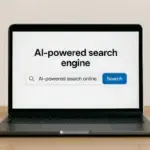Now Reading: What’s New in Google AI Tools for Developers 2025
- 01
What’s New in Google AI Tools for Developers 2025

What’s New in Google AI Tools for Developers 2025
If you’re curious about the future of tech, the latest Google AI tools for developers revealed at Google I/O 2025 are a big deal. This year’s event was packed with exciting updates, from smarter AI assistants to powerful new tools that help developers build faster, better, and more intuitive apps.
In this post, we’ll break down the most important AI innovations from Google I/O, explore the new capabilities of Google Gemini AI, and explain what it all means for everyday users and developers alike.
What is Google I/O and Why It Matters
Every year, Google hosts a major event called Google I/O, short for “Input/Output.” But don’t let the technical name fool you, this event isn’t just for hardcore developers. It’s actually one of the most exciting tech showcases on the calendar. It’s where Google reveals its biggest ideas, newest software, and bold visions for the future. In 2025, the spotlight was clearly on the latest Google AI tools for developers, and for good reason because they’re reshaping how we interact with technology in everyday life.
Think of Google I/O as the tech world’s version of a movie premiere. Thousands of developers, tech enthusiasts, and investors around the globe tune in to see what’s coming next. And each year, it sets the tone for the tools and trends we’ll all be using soon, whether we’re building apps, running businesses, or just using our phones.
This year, Google I/O 2025 highlights included a big push into artificial intelligence, especially through updates to Google Gemini AI. Gemini isn’t just another chatbot or assistant but a more advanced, deeply integrated AI that’s being built into everything from Android to Gmail. What stood out most this year was how these innovations aren’t just experimental but they’re ready to use, and they’re coming fast.
Over the years, Google has made some major AI milestones at these events. Remember when Google first introduced its voice assistant, or when real-time translation made headlines? Those breakthroughs came from previous I/O announcements. And now, with the new generation of AI innovations from Google I/O, we’re seeing even more impressive leaps forward. Innovations like smarter AI coding assistants, tools for app automation, and seamless AI features built directly into Google’s most-used platforms.
So why does all this matter to you, even if you’re not a developer? Because the tools and ideas shared at I/O eventually become the features you use every day. Think about auto-complete in Gmail, better photo search in Google Photos, or even predictive text on your phone’s keyboard. These changes start with the Google AI tools for developers, but they reach everyone.
In short, Google I/O isn’t just about future tech, it’s about the very real updates that are shaping your digital life right now. Whether you’re coding the next big app or just using your favorite Google tools, what happens at I/O touches us all.
Highlights from Google’s AI Announcements in 2025
At this year’s event, the spotlight was clearly on the Google AI tools for developers, and the updates didn’t disappoint. From major platform upgrades to new AI models and smoother integrations, Google I/O 2025 highlights showcased just how serious Google is about leading the AI race.
The biggest star of the show is Google Gemini AI. This next-gen language model is smarter, faster, and more deeply connected to the tools we use every day. Unlike the earlier versions, Gemini in 2025 doesn’t just respond to commands but it understands context, predicts what you might need next, and even suggests full code blocks for developers writing apps or AI features. Gemini is now woven into everything from Android to Google Cloud, bringing advanced AI capabilities to developers and end users alike.
During the keynote speech, Sundar Pichai (Google’s CEO) introduced a suite of AI-first features, clearly marking a shift toward a future powered by smarter tools. One of the most talked-about announcements was Gemini Code Assist, an AI-powered coding assistant built right into Android Studio. This tool helps developers write better code faster. It works just like an intelligent co-pilot that’s available 24/7. It even explains your code in plain English, which is helpful whether you’re new to coding or just working through a tricky bug.
But the innovations didn’t stop there. Google also rolled out an upgraded set of Google AI tools for developers in the cloud, including new APIs for natural language processing, image generation, and speech-to-text features. These are more powerful and flexible than ever, making it easier to build custom AI features into apps without needing a PhD in machine learning.
On the hardware side, Google unveiled its latest Tensor Processing Unit (TPU), built to run massive AI models with lightning speed and lower energy use. It’s the kind of behind-the-scenes power that makes advanced features feel instant and seamless for users.
All in all, the AI innovations from Google I/O this year were more practical than flashy. The focus wasn’t on wild futuristic demos; it was on giving developers tools they can actually use now. Whether it’s Gemini in Android, smarter APIs, or improved developer workflows, Google is making it clear that if you’re building something in 2025 and beyond, you’ll want these tools in your toolkit.
How These AI Tools Will Impact Users
Even if you’re not a coder or developer, the new Google AI tools for developers rolled out at Google I/O 2025 are going to impact your digital life in some pretty exciting ways. These tools might be made for developers, but the end result is smoother, smarter experiences for everyone. And honestly, the changes are already showing up in the apps and services you use every day.
One of the biggest Google I/O 2025 highlights was how deeply AI is being woven into Google’s entire ecosystem. From Gmail and Docs to Maps and Android, Google Gemini AI is now working behind the scenes to boost productivity, speed, and ease of use. For example, in Google Workspace, Gemini can now draft full emails, suggest better ways to organize your calendar, and even summarize long documents. This is saving time whether you’re working, studying, or just trying to stay on top of things.
If you’re an Android user, you’ll notice even more changes. Gemini is now built into the latest version of Android, offering features like on-device AI that can suggest replies in messaging apps, help edit photos, or even offer contextual help based on what’s on your screen. And because it runs locally on your phone, it’s faster and more private. This is one of the most practical AI innovations from Google I/O. The AI that’s smart but doesn’t need the cloud to work.
Search is also getting an upgrade. With Gemini’s help, Google Search is becoming more conversational. Instead of typing in stiff keywords, you can ask questions more naturally, and the results are more helpful, often combining sources or offering quick summaries. Whether you’re planning a trip, shopping for tech, or looking up health tips, it just feels easier.
And for small businesses or solo creators, these Google AI tools for developers mean you can now add features like smart chatbots, content recommendations, or even voice controls to your websites or apps without needing a big team or deep AI knowledge.
So, what does this mean for everyday users like you? In short: more helpful apps, faster responses, fewer repetitive tasks, and a better overall digital experience. Thanks to Google Gemini AI and the broader push in AI innovations from Google I/O, the tools are becoming smarter so you don’t have to work harder.
AI for Developers: What’s New & Why It Matters for You
If you’re a developer or even thinking about becoming one, 2025 might be one of the most exciting years yet, thanks to the latest Google AI tools for developers. At Google I/O 2025, we saw a major shift in how Google is equipping developers to build faster, smarter, and more intuitive apps with less hassle. And even if you’re not coding today, what’s coming down the pipeline will shape the apps and websites you use tomorrow.
One of the standout Google I/O 2025 highlights was the upgraded Gemini API. This isn’t just another backend tool. It is a flexible and powerful interface that gives developers access to Google Gemini AI’s most advanced capabilities. From real-time translation to natural language chat and smart search functions, the Gemini API makes it easier than ever to bake intelligence directly into apps. Whether you’re working on a mobile game, a customer service chatbot, or a productivity tool, this AI backbone can help you deliver features users love without reinventing the wheel.
Another exciting update is in Android Studio. Google introduced new AI-powered enhancements that turn your development environment into something like a co-pilot. It can now autocomplete entire code blocks, catch errors before you run your app, and even suggest improvements based on best practices. This is more than just convenience because it speeds up development, improves code quality, and helps newer developers feel more confident.
It’s something worth noting that these Google AI tools for developers aren’t just about making cool things, they also give you a competitive edge. Early adopters of AI tools often get to market faster, offer smarter features, and deliver smoother user experiences. That can make a big difference if you’re building a startup, freelancing, or competing in a crowded app space.
What’s especially promising is how Google has made these tools more accessible. You don’t need a massive team or a huge budget. Many of the new tools, APIs, and cloud-based services are available for free or at a low cost to get started, making it easier for indie developers and small businesses to innovate.
Thanks to the AI innovations from Google I/O, building apps in 2025 and beyond is less about writing endless lines of code and more about creating great user experiences with help from smart tools like Google Gemini AI. Whether you’re an experienced developer or just starting out, there’s never been a better time to build with AI at your side.
The Future of AI with Google
Looking ahead, the direction Google is taking with its AI tools has industry experts buzzing, and it’s for good reason. The new Google AI tools for developers revealed at Google I/O 2025 aren’t just upgrades. This represent a long-term vision for how Google sees the future of digital experiences, app creation, and even everyday tasks. And that future is more intelligent, more personalized, and more accessible to everyone.
So, the big picture here is that experts agree that Google Gemini AI is more than just a language model. It’s becoming the brain behind everything Google offers. It’s showing up in Android, Chrome, Workspace, and even the tools developers use to build apps and services. And unlike earlier versions of AI that felt like add-ons, Gemini is now baked into the experience. According to AI analysts, this deep integration is what sets Google apart from competitors like OpenAI, Microsoft, and Amazon.
In fact, when comparing this year’s AI innovations from Google I/O to what others are doing, there are some key differences. Microsoft has invested heavily in integrating AI into its Office suite and Azure cloud platform. OpenAI, the creator of ChatGPT, continues to push conversational AI forward. Amazon is focused on voice-based tools like Alexa. But Google’s approach is broader and more user-facing. Gemini doesn’t just sit in the background, it’s showing up directly in tools people use every day, helping with writing, coding, searching, and even learning.
For developers, this is very important. The Google AI tools for developers are now built with long-term growth in mind. Instead of having to learn complex machine learning systems from scratch, developers can plug into tools like Gemini API, use pre-trained models, and get real-time AI feedback in their development environments. That saves time and opens the door to more creative, powerful apps.
Industry insiders also point out that this level of AI integration raises new expectations. Users will begin to expect apps that anticipate their needs, respond to natural language, and feel “smart” right out of the box. That means developers and businesses who get on board early with these tools will have a head start and those who wait may struggle to keep up.
As we look toward the next 12–18 months, the momentum from Google I/O 2025 highlights suggests that AI will become more of a built-in feature. And with Google Gemini AI leading the charge, the bar is officially raised.
What You Should Do Next
After looking at all the updates from Google I/O 2025, one thing is crystal clear: the future of tech is here, and it’s powered by AI. From smarter search and upgraded Android features to powerful new developer tools, the latest Google AI tools for developers are setting a new standard for what’s possible. This is not just hype. These tools are already starting to shape how we live, work, and build with technology.
What’s exciting is how deeply Google Gemini AI is now woven into everything Google offers. It’s not just helping developers, it’s helping you the user, experience faster, smarter, and more personalized interactions across Google’s products. Whether you’re typing an email, building an app, or just searching for a recipe, the impact of this year’s AI innovations from Google I/O is already showing up in real ways.
For developers, now is the perfect time to start exploring these tools. The Gemini API, AI-assisted coding features, and enhanced cloud services are all designed to lower the barrier to entry. You don’t need to be an AI expert to build with AI anymore. That’s a head start, especially for indie creators, small business owners, and startup founders who want to stand out in a crowded tech space.
And for everyday users, there’s plenty to be excited about too. Expect your apps to get smarter, your phone to become more helpful, and your favorite Google tools to offer even more value. What used to feel like “future tech” is now at your fingertips, thanks to the ongoing push behind the Google AI tools for developers.
So, what should you do next?
If you’re a developer, go check out the new Gemini-powered APIs and tools available in Google Cloud or Android Studio. Even if you’re just learning, experimenting now will give you a major head start.
If you’re just tech-curious, try out some of the AI features already in Google Workspace, Search, or Android. You’ll be surprised how helpful they can be.
And if you want to keep up with this fast-changing space, don’t forget to subscribe to our tech news. We’ll be breaking down all the latest tools, updates, and trends so you can stay informed without needing a tech degree. While you’re here, check out our other great articles on AI innovations below.
Amazing AI Tech Events Disrupting The Industry
Top 3 Notable AI Breakthroughs in 2025
The future of AI is unfolding in real time, and Google’s leading the charge.














